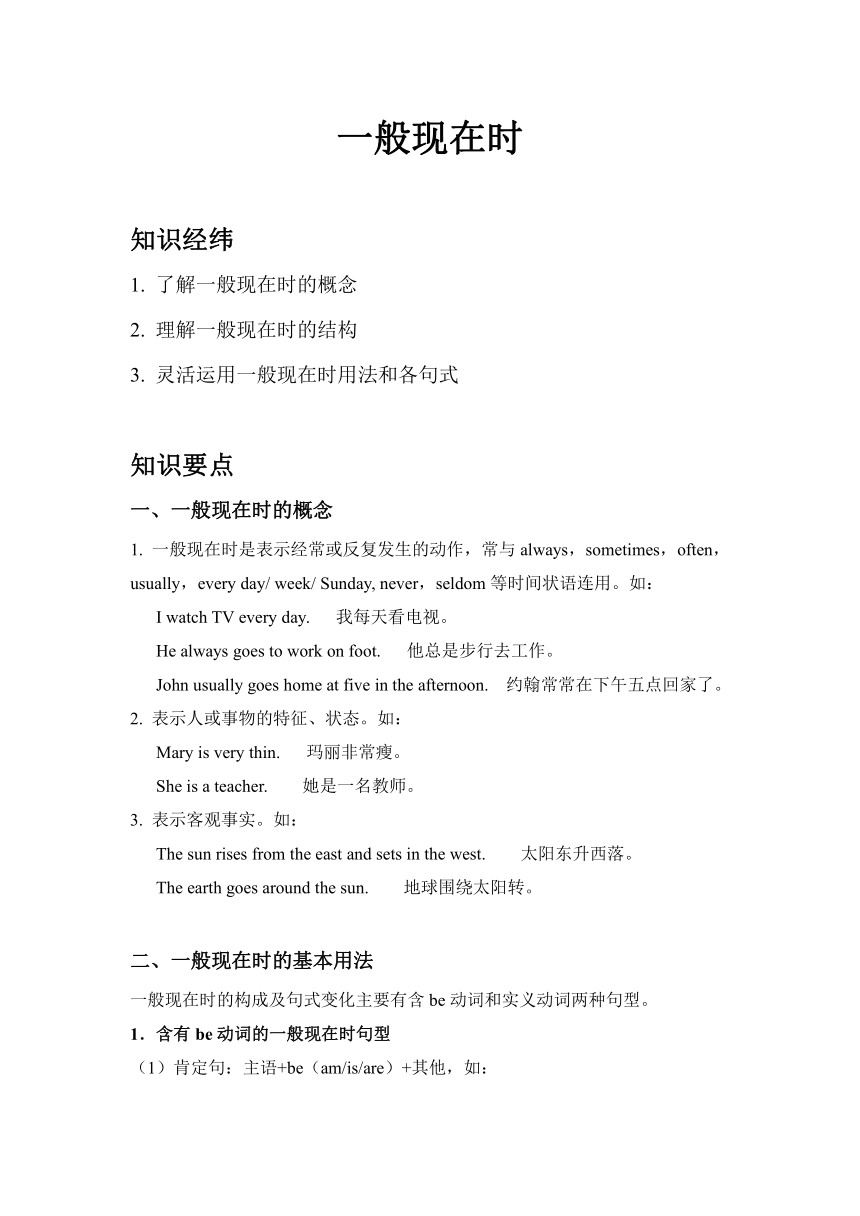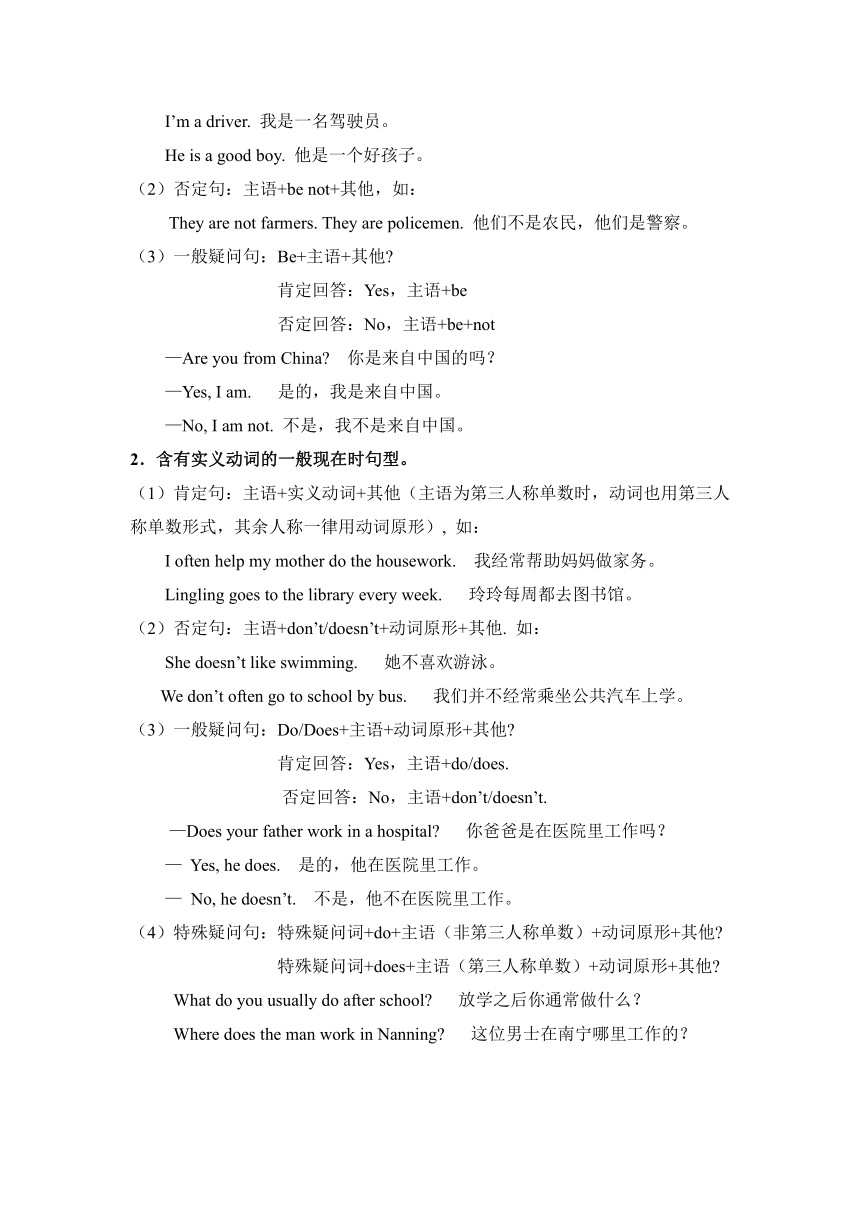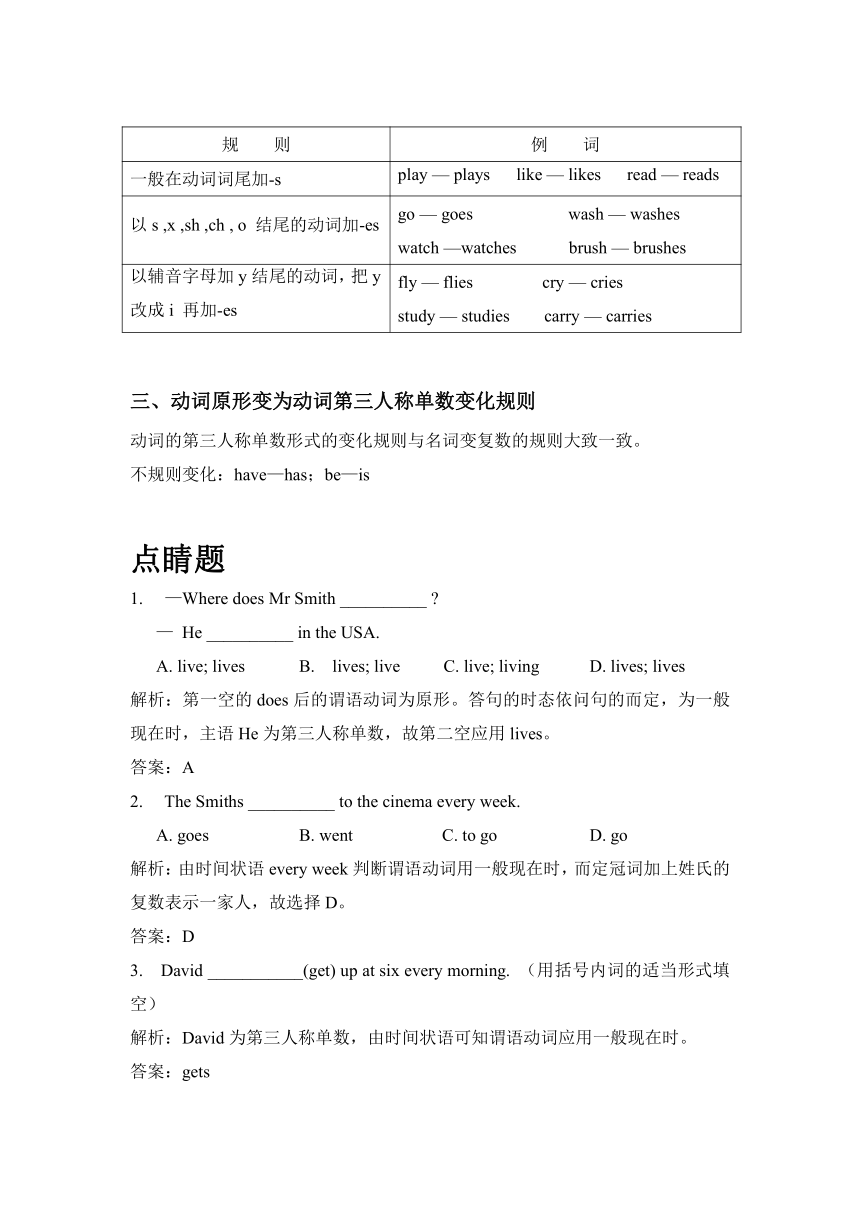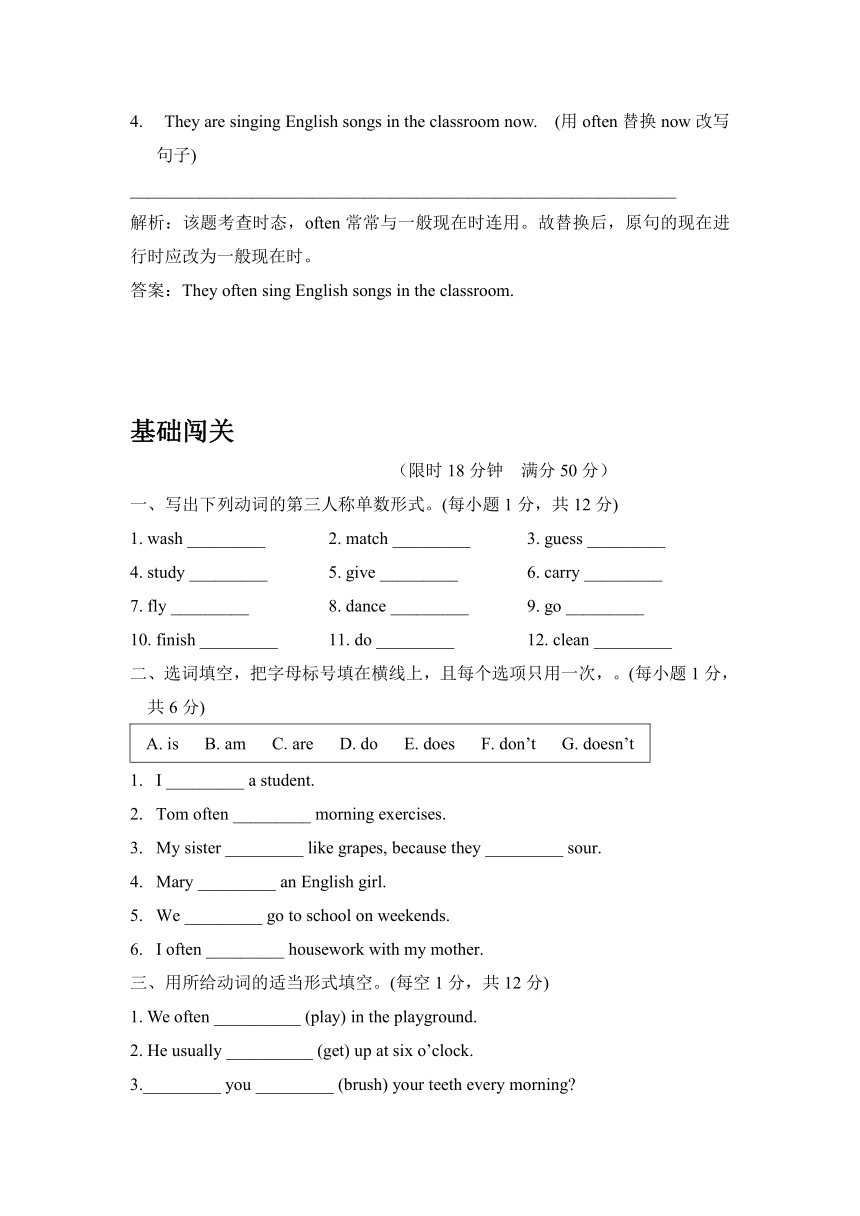2023-2024学年外研版小升初英语语法专项一般现在时讲义+练习(含答案 )
文档属性
| 名称 | 2023-2024学年外研版小升初英语语法专项一般现在时讲义+练习(含答案 ) |

|
|
| 格式 | docx | ||
| 文件大小 | 28.1KB | ||
| 资源类型 | 教案 | ||
| 版本资源 | 外研版 | ||
| 科目 | 英语 | ||
| 更新时间 | 2024-05-29 00:00:00 | ||
图片预览




文档简介
一般现在时
知识经纬
1. 了解一般现在时的概念
2. 理解一般现在时的结构
3. 灵活运用一般现在时用法和各句式
知识要点
一、一般现在时的概念
1. 一般现在时是表示经常或反复发生的动作,常与always,sometimes,often,usually,every day/ week/ Sunday, never,seldom等时间状语连用。如:
I watch TV every day. 我每天看电视。
He always goes to work on foot. 他总是步行去工作。
John usually goes home at five in the afternoon. 约翰常常在下午五点回家了。
2. 表示人或事物的特征、状态。如:
Mary is very thin. 玛丽非常瘦。
She is a teacher. 她是一名教师。
3. 表示客观事实。如:
The sun rises from the east and sets in the west. 太阳东升西落。
The earth goes around the sun. 地球围绕太阳转。
二、一般现在时的基本用法
一般现在时的构成及句式变化主要有含be动词和实义动词两种句型。
1.含有be动词的一般现在时句型
(1)肯定句:主语+be(am/is/are)+其他,如:
I’m a driver. 我是一名驾驶员。
He is a good boy. 他是一个好孩子。
(2)否定句:主语+be not+其他,如:
They are not farmers. They are policemen. 他们不是农民,他们是警察。
(3)一般疑问句:Be+主语+其他
肯定回答:Yes,主语+be
否定回答:No,主语+be+not
—Are you from China 你是来自中国的吗?
—Yes, I am. 是的,我是来自中国。
—No, I am not. 不是,我不是来自中国。
2.含有实义动词的一般现在时句型。
(1)肯定句:主语+实义动词+其他(主语为第三人称单数时,动词也用第三人称单数形式,其余人称一律用动词原形), 如:
I often help my mother do the housework. 我经常帮助妈妈做家务。
Lingling goes to the library every week. 玲玲每周都去图书馆。
(2)否定句:主语+don’t/doesn’t+动词原形+其他. 如:
She doesn’t like swimming. 她不喜欢游泳。
We don’t often go to school by bus. 我们并不经常乘坐公共汽车上学。
(3)一般疑问句:Do/Does+主语+动词原形+其他
肯定回答:Yes,主语+do/does.
否定回答:No,主语+don’t/doesn’t.
—Does your father work in a hospital 你爸爸是在医院里工作吗?
— Yes, he does. 是的,他在医院里工作。
— No, he doesn’t. 不是,他不在医院里工作。
(4)特殊疑问句:特殊疑问词+do+主语(非第三人称单数)+动词原形+其他
特殊疑问词+does+主语(第三人称单数)+动词原形+其他
What do you usually do after school 放学之后你通常做什么?
Where does the man work in Nanning 这位男士在南宁哪里工作的?
三、动词原形变为动词第三人称单数变化规则
动词的第三人称单数形式的变化规则与名词变复数的规则大致一致。
不规则变化:have—has;be—is
规 则 例 词
一般在动词词尾加-s play — plays like — likes read — reads
以s ,x ,sh ,ch , o 结尾的动词加-es go — goes wash — washes watch —watches brush — brushes
以辅音字母加y结尾的动词,把y改成i 再加-es fly — flies cry — cries study — studies carry — carries
点睛题
—Where does Mr Smith __________
— He __________ in the USA.
A. live; lives B. lives; live C. live; living D. lives; lives
解析:第一空的does后的谓语动词为原形。答句的时态依问句的而定,为一般现在时,主语He为第三人称单数,故第二空应用lives。
答案:A
The Smiths __________ to the cinema every week.
A. goes B. went C. to go D. go
解析:由时间状语every week判断谓语动词用一般现在时,而定冠词加上姓氏的复数表示一家人,故选择D。
答案:D
3. David ___________(get) up at six every morning. (用括号内词的适当形式填空)
解析:David为第三人称单数,由时间状语可知谓语动词应用一般现在时。
答案:gets
They are singing English songs in the classroom now. (用often替换now改写句子)
_______________________________________________________________
解析:该题考查时态,often常常与一般现在时连用。故替换后,原句的现在进行时应改为一般现在时。
答案:They often sing English songs in the classroom.
基础闯关
(限时18分钟 满分50分)
写出下列动词的第三人称单数形式。(每小题1分,共12分)
1. wash _________ 2. match _________ 3. guess _________
4. study _________ 5. give _________ 6. carry _________
7. fly _________ 8. dance _________ 9. go _________
10. finish _________ 11. do _________ 12. clean _________
二、选词填空,把字母标号填在横线上,且每个选项只用一次,。(每小题1分,共6分)
A. is B. am C. are D. do E. does F. don’t G. doesn’t
I _________ a student.
Tom often _________ morning exercises.
My sister _________ like grapes, because they _________ sour.
Mary _________ an English girl.
We _________ go to school on weekends.
I often _________ housework with my mother.
三、用所给动词的适当形式填空。(每空1分,共12分)
1. We often __________ (play) in the playground.
2. He usually __________ (get) up at six o’clock.
3._________ you _________ (brush) your teeth every morning
4. What __________ (do) he usually_________(do) after school
5. Danny__________ (study) English, Chinese, Maths, Science and Art at school.
6. Mike sometimes __________ (go) to the park with his sister.
7. Daniel and Tommy __________ (be) in Class One.
8. I _________ (be) ill. I’m staying in bed.
9. —What day _________ (be) it today — It’s Saturday.
10. He often _________ (have) dinner at home.
四、单项选择题。从所给的四个选项中选出最佳选项,并填入题前的括号内。(每小题2分,共20分)
( ) 1. They _________ teachers.
A. is B. am C. are D. does
( ) 2. Su Hai and Su Yang _________ eight lessons this term.
A. have B. has C. had D. does
( ) 3. We all _________ our new English teacher.
A. likes B. loves C. like D. loved
( ) 4. Where ________ you from
A. are B. do C. is D. does
( ) 5. Where _________ you come from
A. is B. are C. do D. does
( ) 6. I like watching TV, but my mother _________ like it.
A. don’t B. doesn’t C. does D. isn’t
( ) 7. _________ your father drink milk every day
A. Do B. Are C. Does D. Is
( ) 8. Jenny _________ in an office. Her parents _________ in a hospital.
A. work; works B. works; work
C. work; are working D. is working; work
( ) 9. Jenny_________ English at home every evening.
A. studying B. studies C study D studied
( ) 10. My father ________to read newspaper after supper every day.
A. like B. likes C. liking D. liked
名校培优
(限时15分钟 满分50分)
一、单项选择题。从所给的四个选项中选出最佳选项,并填入题前的括号内。(每小题2分,共20分)
( ) 1. _________ you have a book
A. Do B. Are C. Is D. Have
( ) 2. They _________ on a farm.
A. working B. is work C. work D. is worked
( ) 3. —Does Peter like to watch TV — ___________.
A. Yes, he like B. No, he doesn’t
C. Yes, he’d like D. No, he likes
( ) 4. She doesn’t _________ her homework in the afternoon.
A. doing B. to do C. does D. do
( ) 5. Mr. Yang _________ English this term.
A. teaches us B. teaches our C. teachs us D. teach our
( ) 6. —How ________ he go to work — He _________ to work by bike.
A. does; go B. do; goes C. do; go D. does; goes
( ) 7. There _________ a table and two chairs in Jenny’s room.
A. am B. is C. are D. be
( ) 8. _________ she _________ home at six every morning.
A. Is; leave B. Does; leave C. Is; leaves D. Does; left
( ) 9.— ________ you usually late for school — No. __________.
A. Do; I am B. Does; not C. Are; I’m not D. Are; I aren’t
( ) 10.On Sunday he sometimes ________ his clothes and sometimes _________ some shopping.
A. wash; do B. is washing; is doing C. washes; does
二、用所给动词的适当形式填空。(每小题2分,共20分)
He always _________ (do) his homework after class.
—_________ (do) you like swimming — No. I __________.
We often _________ (eat) bread in morning. But my mother never _________ (eat) it.
—_________ (be) he a good student — Yes, he _________.
Jerry _________ (like) climbing. He ________ (climb) with his friend every weekend.
I _________ (be) fine.
My mother often _________ (wash) clothes.
My friend usually _________ (study) at home.
Nick _________ (not go) to the zoo on Sundays.
_________ your parents _________(read) newspapers every day
三、按要求改写句子。(每小题2分,共10分)
1. He speaks English very well. (改为否定句)
___________________________________________________________________
2.John comes from Canada. (对划线部分提问)
___________________________________________________________________
3. Does he go shopping with his mother (作肯定回答)
_____________________________________________________________________
4.There is some water in the bottle. (改为否定句)
_____________________________________________________________________
5. David likes taking photos in the park. (改成一般疑问句)
_____________________________________________________________________
一般现在时答案
基础闯关
一、 1. washes 2. matches 3. guesses 4. studies
5. gives 6. carries 7. flies 8. dances
9. goes 10. finishes 11. does 12. clears
二、 1. B 2. E 3. G ; C 4. A 5. F 6. D
三、 1. play 2. gets 3. Do ; brush 4. does ; do 5. studies
6. goes 7. are 8. am 9. is 10. has
四、 1—5 CACAC 6—10 BCBBB
名校培优
一、 1—5 ACBDA 6—10 DBBCC
二、 1. does 2. Do ; don’t 3. eat ; eats 4. Is ; is 5. likes ; climbs
6. am 7. washes 8. studies 9. doesn’t go 10. Do ; read
三、1. He doesn’t speak English very well.
2. Where does John come from
3. Yes, he does.
4. There isn’t any water in the bottle.
5. Does David like taking photos in the park
知识经纬
1. 了解一般现在时的概念
2. 理解一般现在时的结构
3. 灵活运用一般现在时用法和各句式
知识要点
一、一般现在时的概念
1. 一般现在时是表示经常或反复发生的动作,常与always,sometimes,often,usually,every day/ week/ Sunday, never,seldom等时间状语连用。如:
I watch TV every day. 我每天看电视。
He always goes to work on foot. 他总是步行去工作。
John usually goes home at five in the afternoon. 约翰常常在下午五点回家了。
2. 表示人或事物的特征、状态。如:
Mary is very thin. 玛丽非常瘦。
She is a teacher. 她是一名教师。
3. 表示客观事实。如:
The sun rises from the east and sets in the west. 太阳东升西落。
The earth goes around the sun. 地球围绕太阳转。
二、一般现在时的基本用法
一般现在时的构成及句式变化主要有含be动词和实义动词两种句型。
1.含有be动词的一般现在时句型
(1)肯定句:主语+be(am/is/are)+其他,如:
I’m a driver. 我是一名驾驶员。
He is a good boy. 他是一个好孩子。
(2)否定句:主语+be not+其他,如:
They are not farmers. They are policemen. 他们不是农民,他们是警察。
(3)一般疑问句:Be+主语+其他
肯定回答:Yes,主语+be
否定回答:No,主语+be+not
—Are you from China 你是来自中国的吗?
—Yes, I am. 是的,我是来自中国。
—No, I am not. 不是,我不是来自中国。
2.含有实义动词的一般现在时句型。
(1)肯定句:主语+实义动词+其他(主语为第三人称单数时,动词也用第三人称单数形式,其余人称一律用动词原形), 如:
I often help my mother do the housework. 我经常帮助妈妈做家务。
Lingling goes to the library every week. 玲玲每周都去图书馆。
(2)否定句:主语+don’t/doesn’t+动词原形+其他. 如:
She doesn’t like swimming. 她不喜欢游泳。
We don’t often go to school by bus. 我们并不经常乘坐公共汽车上学。
(3)一般疑问句:Do/Does+主语+动词原形+其他
肯定回答:Yes,主语+do/does.
否定回答:No,主语+don’t/doesn’t.
—Does your father work in a hospital 你爸爸是在医院里工作吗?
— Yes, he does. 是的,他在医院里工作。
— No, he doesn’t. 不是,他不在医院里工作。
(4)特殊疑问句:特殊疑问词+do+主语(非第三人称单数)+动词原形+其他
特殊疑问词+does+主语(第三人称单数)+动词原形+其他
What do you usually do after school 放学之后你通常做什么?
Where does the man work in Nanning 这位男士在南宁哪里工作的?
三、动词原形变为动词第三人称单数变化规则
动词的第三人称单数形式的变化规则与名词变复数的规则大致一致。
不规则变化:have—has;be—is
规 则 例 词
一般在动词词尾加-s play — plays like — likes read — reads
以s ,x ,sh ,ch , o 结尾的动词加-es go — goes wash — washes watch —watches brush — brushes
以辅音字母加y结尾的动词,把y改成i 再加-es fly — flies cry — cries study — studies carry — carries
点睛题
—Where does Mr Smith __________
— He __________ in the USA.
A. live; lives B. lives; live C. live; living D. lives; lives
解析:第一空的does后的谓语动词为原形。答句的时态依问句的而定,为一般现在时,主语He为第三人称单数,故第二空应用lives。
答案:A
The Smiths __________ to the cinema every week.
A. goes B. went C. to go D. go
解析:由时间状语every week判断谓语动词用一般现在时,而定冠词加上姓氏的复数表示一家人,故选择D。
答案:D
3. David ___________(get) up at six every morning. (用括号内词的适当形式填空)
解析:David为第三人称单数,由时间状语可知谓语动词应用一般现在时。
答案:gets
They are singing English songs in the classroom now. (用often替换now改写句子)
_______________________________________________________________
解析:该题考查时态,often常常与一般现在时连用。故替换后,原句的现在进行时应改为一般现在时。
答案:They often sing English songs in the classroom.
基础闯关
(限时18分钟 满分50分)
写出下列动词的第三人称单数形式。(每小题1分,共12分)
1. wash _________ 2. match _________ 3. guess _________
4. study _________ 5. give _________ 6. carry _________
7. fly _________ 8. dance _________ 9. go _________
10. finish _________ 11. do _________ 12. clean _________
二、选词填空,把字母标号填在横线上,且每个选项只用一次,。(每小题1分,共6分)
A. is B. am C. are D. do E. does F. don’t G. doesn’t
I _________ a student.
Tom often _________ morning exercises.
My sister _________ like grapes, because they _________ sour.
Mary _________ an English girl.
We _________ go to school on weekends.
I often _________ housework with my mother.
三、用所给动词的适当形式填空。(每空1分,共12分)
1. We often __________ (play) in the playground.
2. He usually __________ (get) up at six o’clock.
3._________ you _________ (brush) your teeth every morning
4. What __________ (do) he usually_________(do) after school
5. Danny__________ (study) English, Chinese, Maths, Science and Art at school.
6. Mike sometimes __________ (go) to the park with his sister.
7. Daniel and Tommy __________ (be) in Class One.
8. I _________ (be) ill. I’m staying in bed.
9. —What day _________ (be) it today — It’s Saturday.
10. He often _________ (have) dinner at home.
四、单项选择题。从所给的四个选项中选出最佳选项,并填入题前的括号内。(每小题2分,共20分)
( ) 1. They _________ teachers.
A. is B. am C. are D. does
( ) 2. Su Hai and Su Yang _________ eight lessons this term.
A. have B. has C. had D. does
( ) 3. We all _________ our new English teacher.
A. likes B. loves C. like D. loved
( ) 4. Where ________ you from
A. are B. do C. is D. does
( ) 5. Where _________ you come from
A. is B. are C. do D. does
( ) 6. I like watching TV, but my mother _________ like it.
A. don’t B. doesn’t C. does D. isn’t
( ) 7. _________ your father drink milk every day
A. Do B. Are C. Does D. Is
( ) 8. Jenny _________ in an office. Her parents _________ in a hospital.
A. work; works B. works; work
C. work; are working D. is working; work
( ) 9. Jenny_________ English at home every evening.
A. studying B. studies C study D studied
( ) 10. My father ________to read newspaper after supper every day.
A. like B. likes C. liking D. liked
名校培优
(限时15分钟 满分50分)
一、单项选择题。从所给的四个选项中选出最佳选项,并填入题前的括号内。(每小题2分,共20分)
( ) 1. _________ you have a book
A. Do B. Are C. Is D. Have
( ) 2. They _________ on a farm.
A. working B. is work C. work D. is worked
( ) 3. —Does Peter like to watch TV — ___________.
A. Yes, he like B. No, he doesn’t
C. Yes, he’d like D. No, he likes
( ) 4. She doesn’t _________ her homework in the afternoon.
A. doing B. to do C. does D. do
( ) 5. Mr. Yang _________ English this term.
A. teaches us B. teaches our C. teachs us D. teach our
( ) 6. —How ________ he go to work — He _________ to work by bike.
A. does; go B. do; goes C. do; go D. does; goes
( ) 7. There _________ a table and two chairs in Jenny’s room.
A. am B. is C. are D. be
( ) 8. _________ she _________ home at six every morning.
A. Is; leave B. Does; leave C. Is; leaves D. Does; left
( ) 9.— ________ you usually late for school — No. __________.
A. Do; I am B. Does; not C. Are; I’m not D. Are; I aren’t
( ) 10.On Sunday he sometimes ________ his clothes and sometimes _________ some shopping.
A. wash; do B. is washing; is doing C. washes; does
二、用所给动词的适当形式填空。(每小题2分,共20分)
He always _________ (do) his homework after class.
—_________ (do) you like swimming — No. I __________.
We often _________ (eat) bread in morning. But my mother never _________ (eat) it.
—_________ (be) he a good student — Yes, he _________.
Jerry _________ (like) climbing. He ________ (climb) with his friend every weekend.
I _________ (be) fine.
My mother often _________ (wash) clothes.
My friend usually _________ (study) at home.
Nick _________ (not go) to the zoo on Sundays.
_________ your parents _________(read) newspapers every day
三、按要求改写句子。(每小题2分,共10分)
1. He speaks English very well. (改为否定句)
___________________________________________________________________
2.John comes from Canada. (对划线部分提问)
___________________________________________________________________
3. Does he go shopping with his mother (作肯定回答)
_____________________________________________________________________
4.There is some water in the bottle. (改为否定句)
_____________________________________________________________________
5. David likes taking photos in the park. (改成一般疑问句)
_____________________________________________________________________
一般现在时答案
基础闯关
一、 1. washes 2. matches 3. guesses 4. studies
5. gives 6. carries 7. flies 8. dances
9. goes 10. finishes 11. does 12. clears
二、 1. B 2. E 3. G ; C 4. A 5. F 6. D
三、 1. play 2. gets 3. Do ; brush 4. does ; do 5. studies
6. goes 7. are 8. am 9. is 10. has
四、 1—5 CACAC 6—10 BCBBB
名校培优
一、 1—5 ACBDA 6—10 DBBCC
二、 1. does 2. Do ; don’t 3. eat ; eats 4. Is ; is 5. likes ; climbs
6. am 7. washes 8. studies 9. doesn’t go 10. Do ; read
三、1. He doesn’t speak English very well.
2. Where does John come from
3. Yes, he does.
4. There isn’t any water in the bottle.
5. Does David like taking photos in the park
